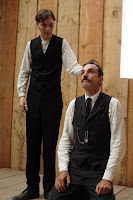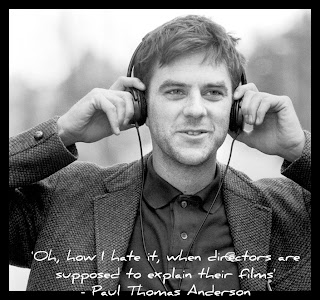What has become of the American entrepreneur?
There are many reasons why we're drawn to tales of industrialists, inventors and entrepreneurs. For starters, their influence is almost inescapable. Tales about them are vis-a-vis tales about us and the world in which we live. If we don't see theirs as stories about what we are, then surely they're stories about what we'd like to be, that ever elusive American dream that we want to achieve, and their eventual corruption and fall from grace (common in movies, not in reality) gives our schadenfreude a nice shot of adrenaline. Films like Citizen Kane and There Will Be Blood play out an examination of a complex relationship between the psychology of an individual and the sociology of the world that loves and hates them, and at times we see ourselves as both.
 |
| Downhill from here. |
Success. Betrayal. Abandonment.
"I will provide the people of this city with a daily paper that will tell all the news honestly. I will also provide them with a fighting and tireless champion of their rights as citizens and as human beings."Charles Kane comes with his promises too, though once he passes the point of misanthropic no return, somewhere between "it would be fun to run a newspaper" and people will believe "what I tell them to" we don't get to hear, nor care much about what those specific promises may be. The only important ones are his youthfully optimistic "Declaration of Principles." We know they'll eventually be abandoned. Beware businessmen who fancy themselves champions of the people. Plainview's promises on the other hand, of roads, schools and bread seem to be fulfilled, or at least there's no indication that they're not and in what might be his most humanistic moment, he wields his power to stop the abuse of the Sunday children. Is it possible that Plainview's symbiotic relationship with his constituents yields greater results than Kane's supposed charitable one?
It's surprising how similarly the paths of Kane and Plainview develop. Both begin with a stroke of luck, in Plainview's case, striking black gold, for Kane a rich foster father. From there it's right down to business where both are intensely good at what they do and have little to fear from competition. Their first real encounter with reality comes courtesy a supposedly uncontrollable event (the death of a political career and the injury of a child) that amplifies their fears, flaws and inability to control their world. With their lack of power exposed, the next deterioration comes in the form of betrayal by a long time friend or trusted "sibling" emphasizing a reality in which absolutely no one can be trusted. The final blow is the abandonment of a loved one who can no longer bear their dominating presence, leaving them alone with their worthless success. The subsequent outburst of violence by our entrepreneurs acts as one last attack against a world that they can no longer claim absolute dominion over.
The capacity to kill
Now we come to the real major split in the paths of Kane and Plainview. Kane's violent attack is directed toward his house, his possessions, his makeshift prison. His relent comes with the sad admission that he cannot attain the love that he's always wanted. He's failed and he knows it. Plainview's outburst however is not directed so inwardly. He rages against his competition for power. Plainview succeeds. We don't know what comes after the credits roll, but it's almost impossible to read his statement of "I'm finished!" as a concession of regret or submission. In fact it might be a declaration of his own perceived victory.
 |
| Baptism didn't help. |
Hallucinogenic reality
As a final contrast between Citizen Kane and There Will Be Blood, consider what each film's structure says about it's subject. Citizen Kane is a mystery, a puzzle, where pieces must be found and assembled in order to eventually reveal the person that is Charles Kane. Structurally, There Will Be Blood isn't a puzzle. Everything shown is chronological and straight forward. But the high-contrast cinematography and anachronistic music present Plainview's life as something of a bizarre hallucinogenic experience, slightly elevated above what we perceive as normal reality. When you consider how society regards its movers and shakers, we're no longer really interested in what makes them tick as much as we are in the details of the strange worlds they inhabit.
Of course, there's no limit to the number of cinematic entrepreneurs that the medium has produced over the decades. The discussion should include more than Charles Kane, Daniel Plainview and Michael Corleone. But what seems to never fade is our fascination with how their quest and success for the American dream drives them to sorrow or vice or madness. What hasn't changed is the sense that one must abandon themselves if they want to be great, and to some extent it's true, and intriguing how many people still line up to board that particular train. Is There Will Be Blood evidence that we don't expect justice any more? Not necessarily, but keep an eye on the stories of these men in the future to see if their fate is presented as important as the frailty that got them there.
*
















